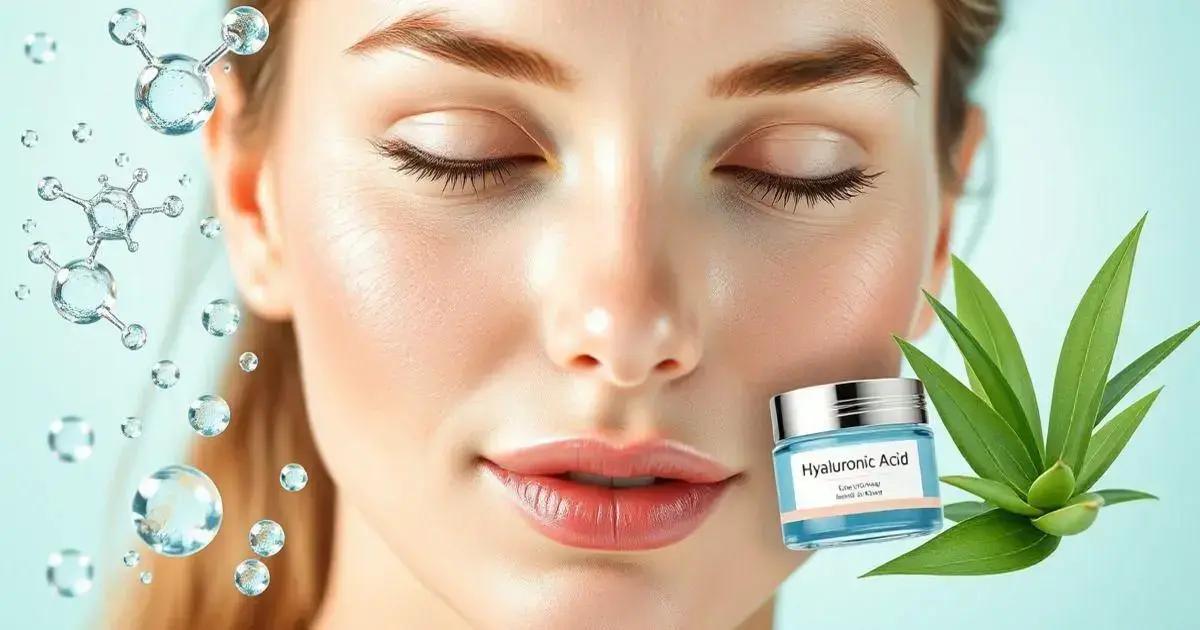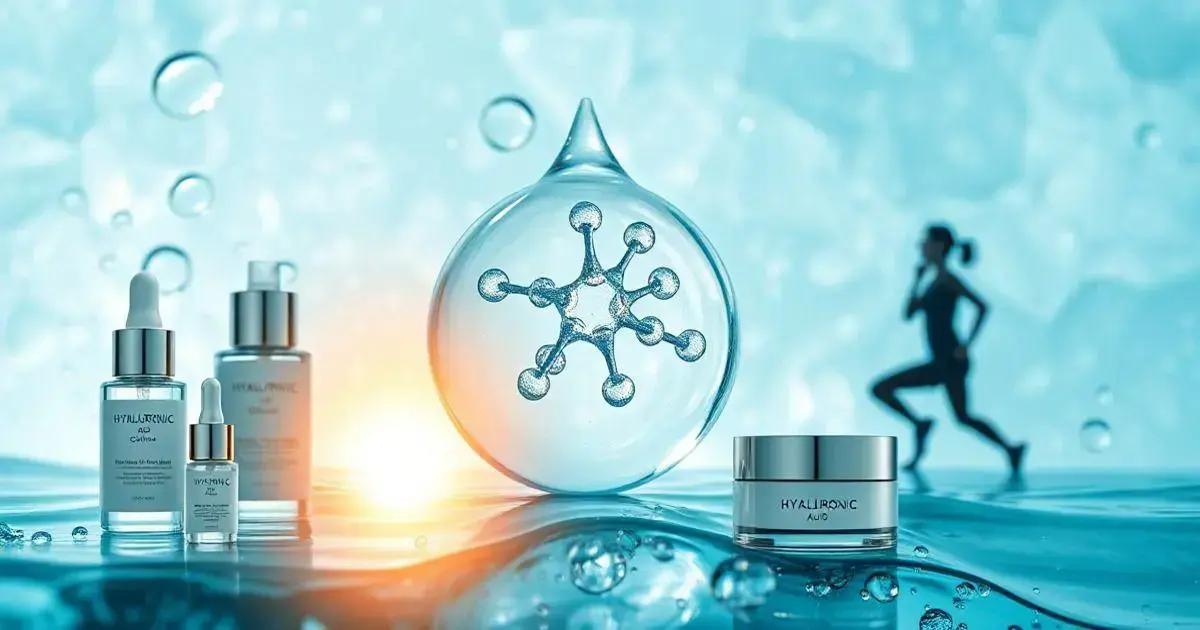Hyaluronic acid is a natural substance that hydrates the skin, reduces fine lines, and improves elasticity, while also supporting joint health by lubricating joints and relieving pain. It can be used in skincare products like serums and creams, and dietary supplements can aid joint function. While generally safe, users should be aware of potential side effects such as skin irritation or allergies.
Hyaluronic acid is a powerful substance that has numerous benefits for your health and beauty. From enhancing skin hydration to supporting joint health, this ingredient is becoming increasingly popular in skincare and wellness products. In this article, we’ll explore what hyaluronic acid does and why it may be a game-changer for you.
What is Hyaluronic Acid?
What is Hyaluronic Acid? Hyaluronic acid is a naturally occurring substance in the body, primarily found in connective tissues, skin, and synovial fluid (the fluid that lubricates joints). It plays a crucial role in retaining moisture, providing elasticity, and maintaining the structural integrity of our skin and joints.
This powerful humectant can hold up to 1,000 times its weight in water, making it an excellent ingredient for hydration. As we age, natural levels of hyaluronic acid in our body decrease, leading to dryness and the appearance of fine lines and wrinkles. That’s why many people turn to hyaluronic acid supplements or skincare products to replenish their skin’s moisture and maintain a youthful appearance.
In addition to its moisturizing properties, hyaluronic acid also has anti-inflammatory benefits, promoting healing and reducing redness. It’s often used in dermal fillers and skincare formulations to enhance skin texture and plumpness.
Understanding what hyaluronic acid is and how it works is essential for anyone looking to improve their skincare routine or support joint health naturally.

Benefits for Skin
Benefits for Skin
Hyaluronic acid offers a multitude of benefits for the skin that can transform your skincare routine. Here are some of the key advantages:
- Intense Hydration: One of the most significant benefits of hyaluronic acid is its ability to provide deep hydration to the skin. By attracting and retaining moisture, it helps combat dryness, giving your skin a plump and healthy appearance.
- Reduces Fine Lines and Wrinkles: As we age, our skin loses moisture, leading to the formation of fine lines and wrinkles. Hyaluronic acid helps to fill in these lines by providing hydration, making the skin look smoother and more youthful.
- Enhances Skin Elasticity: Hyaluronic acid plays a vital role in maintaining skin elasticity. It helps to keep the skin firm and supple, reducing sagging and promoting a more toned appearance.
- Soothes Sensitive Skin: If you have sensitive or irritated skin, hyaluronic acid can be a soothing agent. Its anti-inflammatory properties help reduce redness and calm irritation, making it suitable for all skin types.
- Supports Skin Barrier Function: Hyaluronic acid aids in strengthening the skin’s natural barrier, which protects against environmental damage and prevents moisture loss. A robust skin barrier is essential for overall skin health.
Incorporating products with hyaluronic acid into your skincare regimen can lead to noticeable improvements in hydration, texture, and overall skin tone, making it a must-have ingredient for anyone looking to enhance their skincare routine.
Support for Joint Health
Support for Joint Health
Hyaluronic acid is not just a skincare hero; it also plays a crucial role in maintaining joint health. Here’s how it supports your joints:
- Lubrication: Hyaluronic acid is a key component of synovial fluid, which lubricates joints and reduces friction during movement. This natural lubrication is essential for smooth joint function and helps to prevent wear and tear on the cartilage.
- Shock Absorption: The viscous nature of hyaluronic acid allows it to act as a shock absorber for joints, cushioning them during high-impact activities. This can be particularly beneficial for athletes or individuals engaging in regular physical exercise.
- Reduces Joint Pain: Studies suggest that hyaluronic acid injections can significantly reduce joint pain, especially in individuals suffering from osteoarthritis. By improving lubrication and cushioning, it helps to alleviate discomfort during movement.
- Promotes Healing: Hyaluronic acid has been shown to promote the healing of damaged cartilage and may aid in the recovery process after joint injuries. Its anti-inflammatory properties can also help reduce swelling.
- Supports Overall Joint Function: Regular use of hyaluronic acid, whether through supplements or topical applications, can help maintain overall joint function and mobility, making it an essential component for anyone looking to support their joint health as they age.
Incorporating hyaluronic acid into your daily routine, whether through dietary supplements or by consuming foods rich in this beneficial compound, can contribute to improved joint health and overall mobility.

How to Use Hyaluronic Acid
How to Use Hyaluronic Acid
Integrating hyaluronic acid into your skincare routine and overall health regimen is simple and effective. Here are some practical tips on how to use it:
- Skincare Products: Look for serums, creams, or lotions that contain hyaluronic acid as a key ingredient. Apply these products on clean, damp skin to maximize moisture absorption. Serums are often the most concentrated form, making them a great choice for targeted hydration.
- Layering: If you’re using multiple skincare products, apply hyaluronic acid serums before heavier creams or oils. This layering technique allows the hyaluronic acid to penetrate deeply and lock in moisture, providing you with optimal hydration.
- Incorporate into Your Routine: For best results, use hyaluronic acid consistently—ideally twice daily, in the morning and at night. This routine helps maintain hydration levels and keeps your skin looking plump and youthful.
- Dietary Supplements: Hyaluronic acid is available in supplement form, which can be beneficial for joint health and overall hydration. Follow the recommended dosage on the label, and consult with a healthcare professional if you have any concerns.
- Hydration Boost: When using hyaluronic acid products, consider misting your face with water before application. This adds extra moisture, allowing the hyaluronic acid to attract and retain even more water in your skin.
By incorporating hyaluronic acid into your daily skincare and health routines, you can enjoy its numerous benefits, from enhanced skin hydration to improved joint health. Remember to choose high-quality products and maintain a consistent routine for the best results.
Potential Side Effects
Potential Side Effects
While hyaluronic acid is generally considered safe and well-tolerated, it’s essential to be aware of potential side effects, especially when using it in high concentrations or through injections. Here are some of the possible side effects:
- Skin Irritation: Some individuals may experience mild irritation, redness, or a burning sensation when applying topical hyaluronic acid products. This is usually temporary and subsides shortly after application. If irritation persists, consider discontinuing use.
- Allergic Reactions: Though rare, allergic reactions can occur. Symptoms may include itching, swelling, or hives. If you notice any of these signs, it’s crucial to seek medical advice and stop using the product immediately.
- Injections Risks: When hyaluronic acid is injected for cosmetic purposes or joint treatment, there are risks involved, such as pain at the injection site, swelling, or bruising. In rare cases, more severe complications may arise, such as infection or an adverse reaction.
- Interactions with Other Products: If you’re using other active ingredients in your skincare routine, such as retinoids or acids (like AHAs and BHAs), be cautious. Combining these with hyaluronic acid can sometimes lead to increased irritation, so it’s best to space out their application.
- Overuse: Using too much hyaluronic acid can lead to an imbalance in moisture levels. If your skin becomes overly hydrated, it may paradoxically lead to dryness or flakiness, as the skin struggles to maintain its natural barrier.
To minimize the risk of side effects, start with lower concentrations of hyaluronic acid and monitor your skin’s response. Always perform a patch test before trying new products, especially if you have sensitive skin or a history of allergic reactions. If you have any concerns about using hyaluronic acid, consult with a dermatologist or healthcare professional.
Conclusion
Hyaluronic acid is a versatile and beneficial ingredient that can significantly enhance both your skincare routine and joint health.
Its powerful hydrating properties help combat dryness, reduce the appearance of fine lines and wrinkles, and improve overall skin elasticity.
Additionally, its role in joint lubrication supports mobility and can alleviate discomfort associated with conditions like osteoarthritis.
By understanding how to effectively use hyaluronic acid—whether through topical products, dietary supplements, or injections—you can unlock its many advantages.
However, it’s essential to be mindful of potential side effects and to consult with a professional if you have any concerns.
Incorporating hyaluronic acid into your daily routine can lead to healthier, more radiant skin and improved joint function, making it a valuable addition to your health and beauty arsenal.
FAQ – Frequently Asked Questions about Hyaluronic Acid
What is hyaluronic acid used for?
Hyaluronic acid is primarily used for hydrating the skin, reducing fine lines, and supporting joint health.
Can hyaluronic acid cause side effects?
While generally safe, potential side effects include skin irritation, allergic reactions, and bruising at injection sites.
How can I incorporate hyaluronic acid into my skincare routine?
You can use serums or creams containing hyaluronic acid, applying them on damp skin to maximize hydration.
Is hyaluronic acid suitable for all skin types?
Yes, hyaluronic acid is suitable for all skin types, including sensitive skin, and can help soothe irritation.
Can I take hyaluronic acid as a supplement?
Yes, hyaluronic acid is available in supplement form and can support joint health and overall hydration.
How often should I use hyaluronic acid products?
For best results, use hyaluronic acid products consistently, ideally twice daily.


